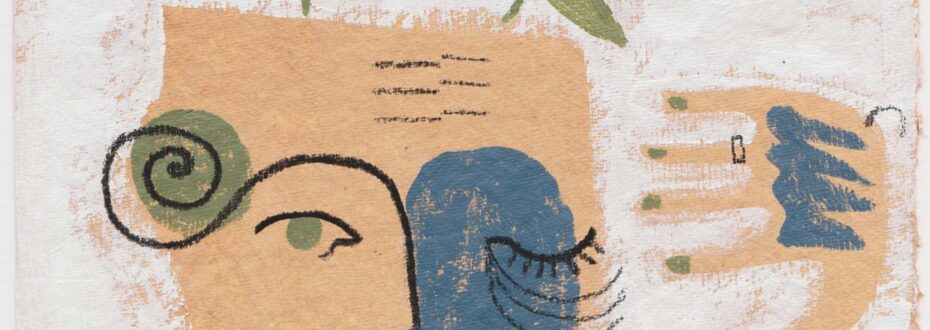I’m a painter and writer inspired by internal dialogue, where big and small thoughts are equally important. As a result, my stomach, and insomnia, have played big roles in my life and work.
I’ve slept poorly, and have had problems with my stomach, for as long as I can remember. By the age of 22 I stopped telling doctors about my stomach, because I was frustrated by multitudes of tests that didn’t produce a definitive solution. I resolved myself to a firm handshake, a smile, and saying ‘I’m well, thanks. How are you?’ during checkups. These always resulted in me being healthy anyway, even though I didn’t always feel like it.
Sleep, or a lack thereof, seems to come in cycles. In certain circumstances, such as outdoors in a tent, I slumber phenomenally for some reason! It always makes me think I should’ve been a bear, and hibernating season would’ve been my favourite. But, mostly I get about three hours a night three times a week, and a normal amount the rest of the time. When there’s a lot to do, or I’m preoccupied or worried, sleep can go down to an hour a night, for up to five days a week. That’s when I begin to really want sleep, which doesn’t help. It’s also when I’m likely to have stomach problems.
By the age of 22 I stopped telling doctors about my stomach, because I was frustrated by multitudes of tests that didn’t produce a definitive solution. I resolved myself to a firm handshake, a smile, and saying ‘I’m well, thanks’.
My digestive system has a curious habit of slowly becoming intolerant to foods, seemingly at random. The gradual process means it’s difficult to identify what the new culprit is. If I can figure it out in time, I abstain for a while, and that usually solves the problem. But, if my detective work is lacking, then I deal with pain so sharp I can’t walk or speak. The only respite is sleep, but as I’ve mentioned, I’m not so good at that particular discipline.
This is when my thoughts can become illogical. I worry that I have some horrible disease – surely I’ve met a plague-carrying rat on my travels! …Google is not your friend in these situations… I begin unrealistically assessing the risk of food causing pain, and become unwilling to take any chance. At its worst, I decided eating wasn’t for me for two weeks.
The first time in ten years I approached a doctor, without a smile, I was so nervous to break the habit that I was shaking. Talking about my symptoms, having medication prescribed, and testing for more serious illnesses, helped put my mind at ease though. Which in turn has contributed to fewer flare-ups of stomach pain, and a still flawed, but improved, sleep cycle.
I begin unrealistically assessing the risk of food causing pain, and become unwilling to take any chance. At its worst, I decided eating wasn’t for me for two weeks.
Without sleep, and sometimes food, my mind works differently. It’s as if someone turns up a volume knob from zero to ten, and the album playing is a gypsy jazz number called ‘Gabriel’s Fleeting Subconscious.’ It whispers the kind of things that pop into your head when making the first cup of tea, before you’ve fully woken up. The paranoid and illogical tracks on that record are a bit unnerving, but the rest can be sweet, sad, and oddly humorous. I listen closely to these passing snippets, and turn the ones I find engaging into stories, or paintings.
My quality of life has improved tremendously since I began talking to a GP about my situation. It made me realise that everything is a balance. The more anxious I am, the more the physical issues occur, and so both the mental and the physical have to be managed. That’s why I think the Centre for Mental Health’s 1000 Conversations campaign is wonderful, and important. Wellbeing is something everyone can benefit from practicing, and maintaining. What helps your wellbeing? It’s a lovely simple question at the heart of the campaign. It’s one that we should ask each other, and ourselves, more often.
The more anxious I am, the more the physical issues occur, and so both the mental and the physical have to be managed.
I’ve not found a magic cure. But I’m getting on better with the balancing act – managing symptoms and worry, and addressing new problems as they arise. Though my passing thoughts are still negative sometimes, I usually put a positive spin on things. I’ve always loved the optimism in Kurt Vonnegut’s novels – it mostly seems to show up in tragic situations. It’s not always how I feel, but it is something to aspire to! And that’s how the thought ‘I think something is rupturing inside me, I wish I was a nice cloud,’ turned into, ‘I released myself from this body. The present was beautiful.’
See more about Gabriel at www.thingsbygabriel.com



